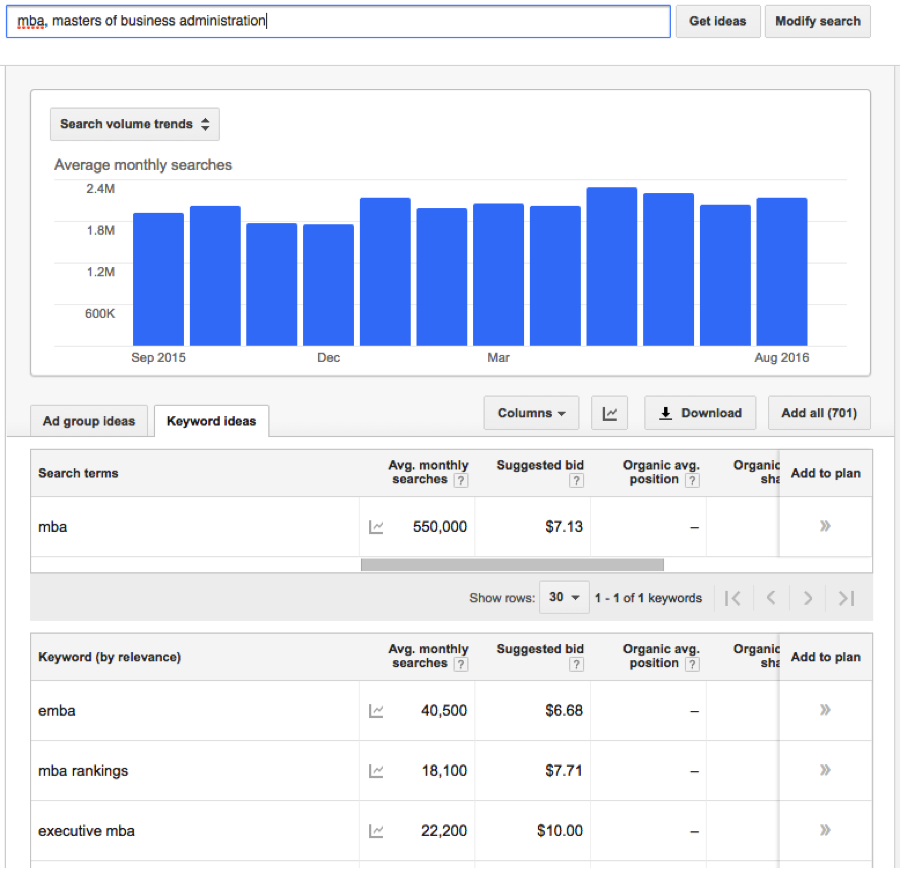Reliable search volume data: a glimmer of hope
While poking around in the Google AdWords keyword research tool recently, I noticed something that made me do a double take.
While poking around in the Google AdWords keyword research tool recently, I noticed something that made me do a double take.
While poking around in the Google AdWords keyword research tool recently, I noticed something that made me do a double take.
I refreshed my browser and re-inputted the same keywords as before. Same result.
Something had changed, and I think it’s for the better.
For the past couple months, I’ve struggled to see the value of Google’s update to the Keyword Planner which now shows aggregated search volume for keywords and close search variants. There have been a number of write-ups about this if you’re curious about how searchies have reacted to this change.
Spoiler alert: not super well.
The logic behind the update is sound: someone searching for “doghouse” is looking for the same thing as someone searching for “dog house.” As such, these terms should be considered a single concept and the reported search volume should reflect this.
However, the logic is only as good as the data that obeys it. While Google seems to understand that “doghouse” and “dog house” are the same thing, other terms that should follow this logic just don’t.
For example, Google still shows drastically different volume numbers for “best multivitamin for women” and “best multi vitamin for women.”

While these glitches (or, shall we say, opportunities for improvement) are still plentiful, I noticed a new change: when you search for terms that Google now qualifies as close variants, only one term will show up in the data table:

Google had previously shown both terms with the same volume. In this instance, the tool used to show:
This was a real kick in the shins for those of us who exported AdWords data into Excel for further keyword analysis. It required manually removing keywords that were – or at least appeared to be – duplicates in order to accurately understand the popularity of a search term.
Otherwise your analysis would assume that a concept like “mba” was twice as popular in search as it truly is.
While this update hasn’t yet been applied to the majority of close search variants like the multivitamin example above, it demonstrates a step in the right direction.
We now have greater visibility (read: proof?) into what words are considered variants of each other.
As Google continues to refine keyword data, we should see less of this:

…especially when Google explicitly tells us that it considers these two queries synonymous.

With better data, we’ll eventually be able to identify keyword variants that seem similar but show unique volume numbers. This may hint at similar terms that actually have different intents and should be addressed with unique content.

Although these two terms may seem the same, the user’s mindset could be vastly different when conducting these searches.
A search for “international shipping” might skew towards listings for companies that provide this service (Consideration phase), while a search for “shipping internationally” might emphasize more informational resources (Interest phase) – what instructions and tips would be helpful for a user to know about shipping something internationally?
While still inconsistent and admittedly a bit unsettling, the AdWords data shakeup is the latest overhaul illustrating how search is evolving from a database of words to a system of concepts.
In addition to good, old-fashioned data cleanup, this seems like an ideal time for some internal data sharing between product teams at Google.
After all, one of the inputs needed to clean up AdWords data – synonyms and typos – is the specialty of another team right down the proverbial hallway. Perhaps a conversation over a plate of peanutbutter – I mean peanut butter – cookies is a good place to start.
Laurel Marcus is Sr. Manager of SEO & Digital Experience at Tank Design. You can follow Laurel on Twitter.